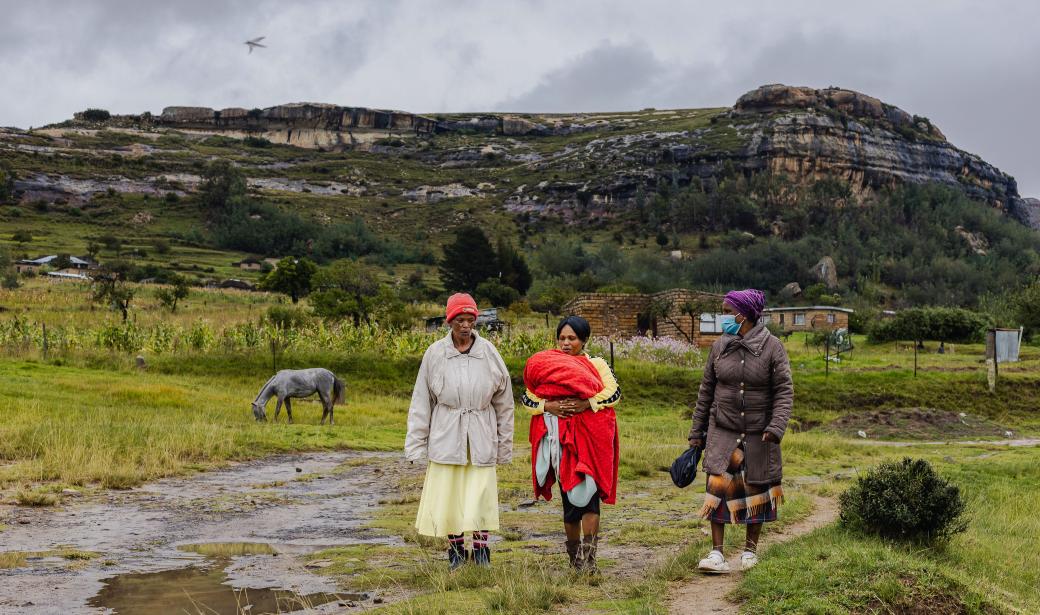Maseru ‒ Lesotho is taking steps to improve maternal and newborn health with the acquisition and management of the m-mama platform, a mobile application for emergency referral to ensure timely pregnancy and childbirth care in communities.
According to the latest WHO estimates, the maternal mortality rate in Lesotho has dropped by almost 10% between 2020 and 2023, from 529 to 478 per 100 000 live births, with an estimated 267 maternal deaths in 2023. While this progress is encouraging, it is still above the average maternal mortality rate for Sub-Saharan Africa of 454 per 100 000 live births. Much remains to be done to achieve the global target of less than 70 per 100 000 live births by 2030.
The leading causes of maternal mortality in Lesotho are severe bleeding (postpartum haemorrhage), pregnancy-related hypertension and complications due to unsafe abortion, all of which being preventable if early care is available and accessible. However, the country does not have enough ambulances to respond to community-based emergencies in hard-to-reach areas, especially those that are maternal and neonatal related.
In 2020, the Vodafone Foundation, in partnership with the Ministry of Health and communities, launched m-mama, an affordable emergency transport service that connects mothers and newborns to life-saving health care. In January 2025, the programme was acquired by the Government of Lesotho.
In 2024, WHO supported Lesotho’s Ministry of Health develop a Digital Health strategy (2025‒2030). Part of WHO’s multipronged approach to support implementation of the strategy is to ensure that m-mama is fully integrated into national digital health frameworks and that governance and ownership of the initiative is strengthened.
Alongside 19 other community drivers, Moleli received training in traffic rules and regulations, first aid, and infection prevention and control, to ensure that they can provide safe and effective emergency transport.
Equipped with her car and the m-mama app on her mobile phone, Moleli is ready to respond, day or night.
She joins 3800 volunteers nationwide, who either use their personal vehicles, their taxis, or when the terrain is more unforgiving, boats or horses, to provide fast and affordable transport to women all over the country.
If medical assistance is needed, the app locates the nearest community driver, who then receives a request to transport the patient to a health facility for stabilization or care.
The dispatcher contacts the facility in advance to confirm its readiness to provide treatment, and if unavailable, redirects the patient to an alternative facility. Upon the patient’s safe arrival at the destination, the driver is compensated for the trip via M-Pesa mobile money app or another approved payment method, at no cost to the user.
"Before m-mama, we faced critical transport shortages, causing severe maternal and neonatal complications and even deaths," says Puseletso Matšela, a nurse dispatcher from Leribe district. "We do not want a single life to be lost and m-mama is making this possible.”
"I was scared, but 'Mantoa arrived quickly and took me to the hospital,” she says. While hospital staff were only able to save her and one of the twins she delivered, they continued to provide essential care to her and her baby, Lineo, and they were discharged a month later. “If it wasn't for m-mama, I don't know what would have happened,” says Nkhasi.
According to the Vodafone Foundation, the US$ 130,000 annual cost of the programme is more affordable than the purchase and operational costs of one ambulance over the same period.
“The success of m-mama stands as a shining example of what we can achieve through unity and shared purpose,” says Her Majesty Queen Masenate Mohato Seeiso. “With our government's steadfast commitment and the proven effectiveness of the m-mama model, lives of countless mothers and babies in Lesotho are secured.”
"The m-mama programme has had a remarkable impact on maternal and newborn health in Lesotho,” says Lesotho’s Minister of Health Selibe Mochoboroane. “We have seen a good reduction in maternal mortality rates, which is in no small part attributable to this life-saving initiative.”
“WHO is proud to support the Ministry of Health in bolstering its health systems through viable digital health strategies that support innovations like m-mama,” says Dr Innocent Nuwagira, WHO Representative in Lesotho. “Together, we are building a future where access to emergency healthcare is not a privilege, but a right for all people in Lesotho."
When she realized her labour was complicated, she called m-mama and received fast transport at no cost. "The nurses and doctor immediately saw that I needed an emergency caesarean section," she says. "Today, recovering well at home. I look at my baby boy and remember how that m-mama call saved both our lives."
Communications Officer
Phone : (266) 590 17166
Email: nangwalel [at] who.int (nangwalel[at]who[dot]int)
Communications and marketing officer
Tel: + 242 06 520 65 65 (WhatsApp)
Email: boakyeagyemangc [at] who.int (boakyeagyemangc[at]who[dot]int)










